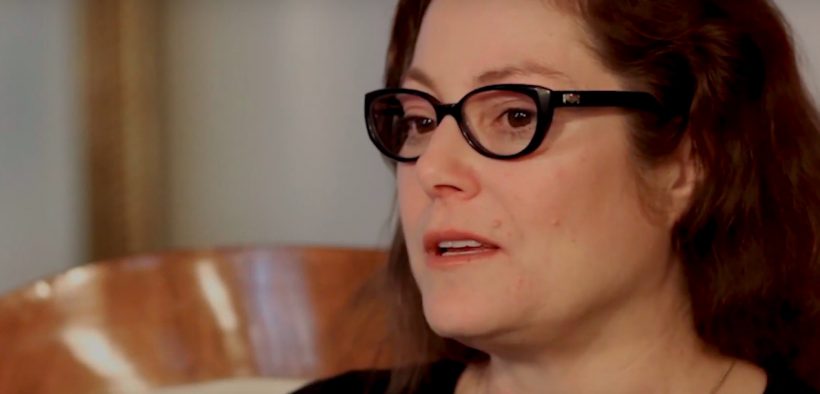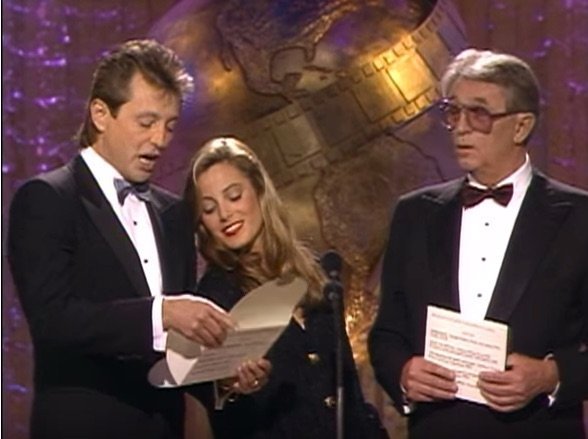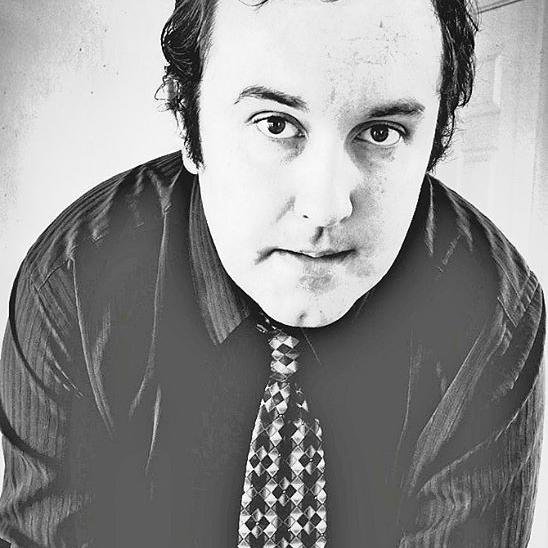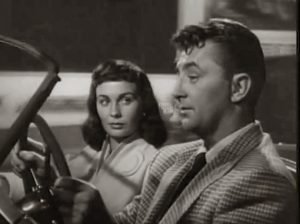On #MeToo and the Horrors of Hollywood’s ‘Casting Couch’ With Carrie Mitchum

Carrie Mitchum’s new documentary Rocking the Couch tells the story of a new group of brave Hollywood professionals sharing their stories for the first time, as well as reviewing an old Hollywood case that could have changed history and the future of the film industry.
I caught up with the incredibly versatile actress, producer, chef, and Robert Mitchum’s granddaughter, Carrie Mitchum for a chat. Carrie gets candid about #MeToo and #TimesUp and her experiences in Hollywood with such a powerful name as Mitchum. These observations are all in her new documentary on Hollywood’s infamous ‘casting couch’ and the crimes of predatory producer Wallace Kaye (who got 5 years for sexual assaults), called Rocking the Couch, on VOD now.
I have always admired Robert Mitchum as an actor and a man. From bringing the laconic ex-PI who’s hiding from his past Jeff Bailey to life in the essential 1947 film noir Out of the Past (read my analysis of it at 70 years on here) to his viscerally-freaky grifter and manipulator the preacher Harry Powell in The Night of the Hunter (you might remember this from Mitchum’s character’s knuckle tattoos: “GOOD” on one hand and “EVIL” on the other), to his portrayal of slimy sociopath and sex criminal Max Cady (a role played by Robert De Niro in Martin Scorsese’s 1991 remake) who terrorizes Gregory Peck’s family in 1962’s Cape Fear, Mitchum was undoubtedly one of Hollywood’s more versatile performers.

The Mitchums (Robert Mitchum, Christopher Mitchum, and Carrie Mitchum) present the 1989 Golden Globe award for Best Supporting Actress in a Mini Series or TV Motion Picture. (Photo: YouTube)
#MeToo in the 1950s
Robert Mitchum was party to a 1950’s-era #MeToo story as well. While filming 1953’s Angel Face with female lead Jean Simmons, Mitchum had to do a scene where his character slaps Simmons’s character in the face. Director Otto Preminger made Mitchum do the scene an absurd number of times. This ultimately caused Mitchum to turn around and slap Preminger instead and then walk out. Preminger complained to producer Howard Hughes after this that he wanted Mitchum fired; a demand Hughes refused.
There was a deeper motivation to Preminger’s behavior during filming. He was not being a perfectionist in the mold of directors like Stanley Kubrick – he was engaged in what amounted to systematic abuse of his lead actress. Why? Because Howard Hughes asked him to.
-
Robert Mitchum and Jean Simmons in 1953’s “Angel Face”
When Hughes and his studio RKO Radio Pictures acquired the script for Angel Face, he sent it along to Preminger to read and evaluate, in the hope that he would sign on to direct. Preminger hated the script though and wanted nothing to do with it. This lead to Hughes personally picking Preminger up in his car and telling him: “I’m going to get even with that little bitch… And you’re going to help me.”
Hughes gave Preminger permission to rewrite the script and promised him a bonus (which he ended up collecting) if he could finish the film in 18 days – the exact amount of time left in Simmons’s contract with RKO. Hughes had bought her contract from England’s J. Arthur Rank Studios without her knowledge. Simmons’s displeasure led her to cut her hair off: Hughes preferred long-haired leading ladies in RKO’s pictures; so Simmons reasoned this would prevent him from using her in anything before her contract was up. Hughes would not be stymied though; he gave her a wig to wear throughout Angel Face’s filming.
The story of Angel Face shows just how prevalent the problems #MeToo and #TimesUp have helped bring to light are – and just how long-lasting. Carrie addresses this in the interview below from her unique perspective as a Mitchum and a celebrity chef – the restaurant industry has these issues too. She also gives us a look at her passions for great food for both humans and pets (a new project of hers).
Enjoy the interview below with Carrie Mitchum and catch Rocking the Couch on VOD now. Check out my interview with Rocking the Couch producer Andrea Evans here.
Welcome Carrie!
Hey… How are you?
Oh, just great. How are you?
I’m well, thank you.
Great! To start things off, I was wondering if we could get an idea of what it was like growing up with your father and your grandfather in the business? And having that name recognition?
Well, you know, it’s funny because obviously when you’re really little, you’re not aware of it. It’s not something that crosses your mind. It’s more about who’s going to give you cookies or cake.
[Laughs] This is true.
It wasn’t until probably… It wasn’t until I was aware that other people were aware of it, that I started to wonder what was going on. You know what I mean? So… Hold on one second.
No problem.
Sorry.
Nothing to apologize for, Carrie.
Thanks. Sorry, someone’s trying to fuss with my door.
No worries.
So yeah. It’s probably not until I was… That I became aware of it that it became even something to look at. It was more when I started to get into the industry that it became something that was sort of in the forefront of my thoughts. Because people would either know my family, personally, and then depending on how their interaction was, they were either really happy to meet me, or not.
If they had a great experience with my dad or my granddad, obviously it was a lot easier for me, than if my grandfather, more so than my father had, had a little altercation.
And things could get a little dicey. I guess, really to answer your question, is once I became aware of it, I really didn’t know any different. You know what I mean? They’d always been my family, and so I don’t have a base level comparison what it would be like not to grow up with my family.
Oh, most definitely. Robert Mitchum is a top favorite actor of mine with Humphrey Bogart.
Yeah.
The documentary Rocking the Couch, and #MeToo, really as a whole, reminded me of a story that involved Robert. Back when they were filming Angel Face, with Otto Preminger directing and Howard Hughes producing.
Oh, yes.
It was that scene where your grandfather’s character had to slap Jean Simmons’ character. And-
Right, I think I just saw that movie again. That’s so funny, yeah.
… And evidently Preminger was being a real jerk about it and Robert turns around and slaps the director. Which Preminger definitely deserved there. So apparently Howard Hughes and Otto Preminger were both basically harassing Jean Simmons, kind of systematically.
Right.
And the question that I had attached to that was, do you think #MeToo and #TimesUp are producing real lasting change in Hollywood?
You know, I’ve given that a lot of thought. And it’s funny because I also participated in a documentary on my grandfather’s… Bruce [Weber] leveraged it. So, I’ve been doing a lot of, both interviews and press on that. And it’s funny because a lot of people bring up that. The same sort of thing, like back in your grandfather’s time, how… Especially women, but men too, were treated as opposed to now. And do we see any sort of permanent change?
I have to hope that the biggest change is going to be in people having found their voice to say, no. And to stand up for themselves. I don’t really think you’re going to change inherent human behavior where someone in power tries to exploit someone without.
I agree.
It’s just sort of like an ugly truth that, as all this time. And I mean, I think that obviously because of legalities people are more aware of it. And because people are being held accountable. Perhaps they’re going to censor their bad behavior a bit. But I think it’s still going to continue and my hope is that the people that have this unwanted attention thrown at them, have the strength in their voice, and that’s what the biggest thing that, I think, this movement will accomplish. Is that the ability to say no, and be heard.
I would love to think that, you know, this is the end of that, but I’m not that naïve. I just don’t see the hard wiring of bad behavior and that power structure just ending overnight. I don’t see that happening.
Yeah, it will definitely take time. I’m with you on that, 100%.
And I think really, what’s so important is that victims find their voice and aren’t complicit and don’t cover up for people and don’t bend to it because that’s where the strength comes from. An asshole is going to be an asshole. That’s just the way it is. But if enough people say no, they won’t have their force, they won’t have a victim.
Definitely. Yeah, most definitely. I’m going to have to check out that other documentary, you mentioned too.
Oh, it’s fantastic. It’s called Nice Girls Don’t Stay For Breakfast. It’s in theaters now in Europe. I don’t know what the west distribution is. But we were in Venice for the Venice Film Festival and we were in Paris in February for the French premieres. It’s been really cool. It’s a great documentary. [Director] Bruce Weber’s a genius.
Definitely. And, you know, some of my favorite movies… Out of the Past is on that list. Love, Out of the Past.
Me too.
And Night of the Hunter as well, is also on there. But, you know, I can’t say I’ve ever seen a Robert Mitchum movie I haven’t liked.
Maria’s Lovers is kind of creepy.
I haven’t seen that one. I’m adding it to my list.
Let’s see. I’m kind of jumping around here a bit. What initially attracted you to Rocking the Couch, as a project?
First and foremost, Andrea [Evans] and I had been friends. I mean, we were trying to figure out the other day when we were talking. We couldn’t figure out when we didn’t know each other.
[Laughs] That’s awesome.
You know, we both started in soaps pretty young. And she was already working by the time I hit the scene. And so, we’ve always had a mutual respect and liking of each other. But I think that when she approached me, I felt like I had a different version of the story to tell because I didn’t really experience the casting couch. You know… Again, it goes back to coming from a family that was basically on the inside of that whole industry.
I think people were more intimidated by me. And so I felt like I had an alternate experience to what most women, in one way or another, in this industry… And men too. I don’t want to say that they didn’t and just speak of the women cases. They’re more in the spotlight now but it definitely happened to men and boys as well.
So I just felt like I have a responsibility to share my story. And I think that the most important thing that I can see is the responsibility that both sides needs to take in order for this to work and to abolish this. Not just in our industry, but basically, life. I mean, I’m a chef now and I see it in the restaurant industry. And I have friends in every career, every walk of life. And they all experience this kind of power struggle. And it usually centers around sexual harassment.
And so, the entertainment industry has a spotlight on it, but it accentuates what’s happening everywhere and people are victims of the sexist finding their voice.
Definitely. It just made me think of Terry Crews who’s been an example there of what’s happening to men.
Yes, exactly. And Corey Feldman has come out. I know stories… You know, my own brother has told me stories. And I guess I was sort of surprised. I felt like he definitely had been sort of under the same protection, but… Veil as me. But there’s always that person that’s going to try something.
And my brother’s like, “Oh yeah, I hit that guy.” Yeah so. I was like, “Wait, what?” So, it definitely happens. Across the board.
Absolutely. Unfortunately men tend to not report, at least when looking at sex crime data.
We kind of talked a bit about this, but the question I had was, what do you hope people will take with them from Rocking the Couch?
Yeah, and I think in a nutshell, is one, it’s not acceptable, it’s not okay. It’s not how things are done. Two, speak up. And three, don’t become part of the problem. And I think that’s a thing that I address a little bit in the documentary. I know, or knew especially, plenty of women that were actually willing to participate in that system and sleep their way to the top. And they just make it really horrible for the rest of the people that don’t want to have that option.
And I think that, those people, if something’s consensual and that’s how they wanted to behave, that’s their business. But, they’re making it horrible for everyone else because they’re allowing these people with the power to feel that, that’s okay, to feel that it’s an option. When it really shouldn’t be on the table.
Oh, absolutely. And that goes back to that whole cultural change too. Yeah. Let’s hope it’s happening.
A bit of a pivot to a question I like to ask everybody. What makes a great film?
For me, as a viewer, I think what makes a great film is when I’m hooked early. So I don’t have to sit there sort of wondering if I have to pee or…
[Laughs] so true.
You know what I mean? Like a little distracted. I think what a great film is, like a great book. You get hooked early and then everything around you falls away. You’re unaware of yourself and you’re unaware of your surroundings because you become so involved, that you’re a part of it, emotionally. Even if you’re not like a fly on the wall, you ride the roller-coaster. And then when it’s over, you just sort of go… I mean, I think the first film I saw in a theater, was Rob Lowe and I went to go see Dead Poets Society.
Oh, wow.
We saw it a little bit later, I guess, after it had been released and we both were just sitting there in the theater… And then he just looked at me. He said, “Wow. I’m so glad I wasn’t starting out when these kids were, are now. Because I’d never have this career.” They captivated us and it was just such a great film. And we just sort of walked around Westwood for a few hours, in a daze. Because it was so powerful, and we were so involved in it. You sort of had to come off it, you know? Recover from it.
And to me, that’s what a great film is. Something that just entrances you.
That’s a great definition. As you can imagine, I get a variety of answers with that one.
Yeah.
It’s a purposely big question. But, let’s see. Actually the last one that I had for you, is what’s next?
Well, it’s funny, because I’m a little bit all over that, because of being a chef. And as someone in the entertainment industry, the first thing I’m doing is I want to produce a documentary on Bruce Weber actually.
Oh?
One of the things he did in his documentary on my grandfather… Is he actually started the documentary when my grandfather was still alive.
Wow. So 1997 or before.
And there’s a lot of great footage and interviews with them, in it. And so, you don’t see oftentimes a person participate in their own story on a documentary. It’s usually posthumous or they’re not being interviewed for their own documentary. So, I really liked that model and my idea is to have various people produce certain segments.
And I spoke with Andrea [Evans] about producing… Addressing the accusations and allegations that have been made against Bruce.
Oh?
And even though his are… When you read the court documents, there’s no allegations of, “Oh, he touched me.” It’s more, “He made me uncomfortable.”
But, it’s still an allegation and it’s still a part of the whole #MeToo movement and so I thought Andrea would be perfect to produce that segment. I have another friend who… A documentary film producer whose father was president of this really big fashion house. And so, I would like her to produce the story of his work in fashion. And so, I want to get about five different producers together and put a documentary together.
And I’m excited about that. And then the other thing I’m doing, is I’m doing a vegan, ethically sourced, sort of sustainable dog food.
That’s great.
Which is completely different from the other things. You know, as a chef, I’ve worked with Alice Waters, to get sustainable food into the college level. I was the executive chef of a college. And I just really believe in the slow food movement. And I am a pet rescuer… Right now, I only have three dogs. But I usually have three or four rescues, plus a few fosters.
And I’m really interested in pet nutrition. And I believe it follows human trends. And I think that the trend is going to be towards more plant-based food. If we consider climate and the current imprint of eating the amount of factory farmed meat we do… Especially in this country.
But, I guess it became something that I got really fascinated with and excited about.

















Carrie Mitchum is insane. So enslaved to trading on her grandfathers legacy it is embarrassing to witness. As demonstrated in the “interview” which really a puff piece, she can barely complete a sentence without repeatedly reminding the audience that she “is a Mitchum”. An avid drug addict and alcoholic, she has been spoiled beyond redemption, throughout her life and is so disconnected from reality and telling the truth that she would almost inspire pity…if she were not merciless and egotistical with other people. It is sad legacy that Robert Mitchum has left behind. Not one of his descendants amounted to anything. This is what happens when celebrities are bad parents. Good luck, Carrie. You’re going to need it. Oh, did I forget to mention? She is Mitchum… whoever that once was.